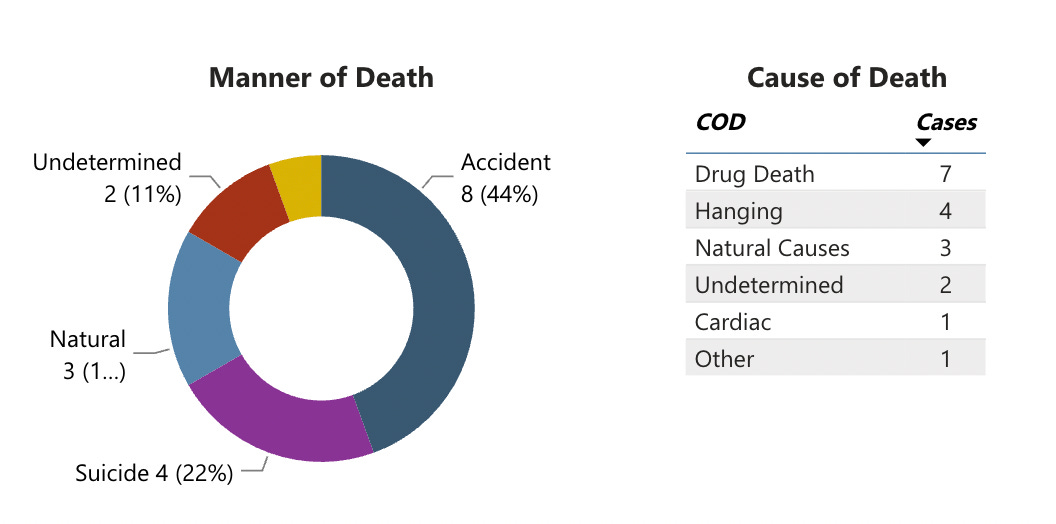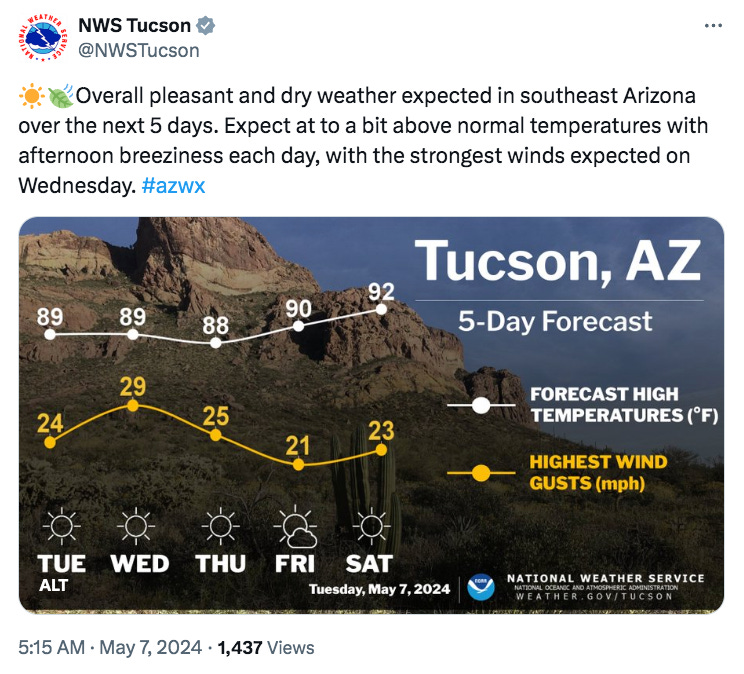The Daily Agenda: Lappin isn't your typical candidate
Heather Lappin is facing off against four men to be the next Pima County Sheriff ... But her gender isn't the only thing that sets her apart ... Border legislation is back.
When most people think of Arizona sheriffs, dusky-haired men wearing cowboy hats and boots usually come to mind, in large part because that’s what most of them have looked like.
In fact, Pima County has never had a woman sheriff, but Heather Lappin is hoping to change that.
A 19-year veteran of the Pima County Sheriff’s Department, Lappin is running as a Republican and facing three other challengers in the race to replace Democrat Chris Nanos as the county’s top cop.
Believe it or not, all of those challengers are men.
And while Lappin’s gender separates her from the pack, she says there’s a lot about her that’s different from the other contenders, calling herself an atypical candidate.
Lappin has raised more money than her opponents, reporting $32,000 in contributions in the first round of campaign finance reports. That’s a lot more than incumbent Sheriff Nanos, who brought in just $11,700 (with $9,200 of it coming from family members.)
She’s also earned the endorsement of the Pima County Deputy Organization, the largest of the three deputy unions, and the Tucson Crime Free Coalition, a nonprofit whose mission is a safer community through the enforcement of laws.
Lappin currently serves as a commander in the Pima County jail, which has afforded her an inside look at one of the biggest problems whoever becomes sheriff will have to handle.
But she also comes with the unique perspective of the mother of a child who has struggled with substance use issues. Her son just celebrated a year of sobriety, but Lappin said it was a long road to get there.
She expected her opponents to use her child’s history against her but said the current state of the department made it impossible to turn her back on the need for new leadership.
“I’m not your typical candidate. We filed bankruptcy in 2010 because my husband lost his job. My oldest is a drug addict and I put him in four different rehabs. So there’s some messiness that they could bring up and I was concerned about that,” she said. “But at the end of the day, you watch the people you love and have grown up with get treated really badly. I saw it happening to other people and I couldn’t stand by and just worry about Heather right now.”
Lappin said she didn’t consider herself a good candidate until people convinced her otherwise and that it was time for a change at the top. She said she’s spent years teaching and studying leadership (she’s about to graduate with her master’s degree in organizational leadership from Northern Arizona University), which gave her some insight into the department’s current leadership style.
“It’s not bad, just antiquated. They’re old fashioned and it’s that power, ego, ‘do as I say,’ and it’s fear-based. I believe in collaborative leadership,” she said. “When you get people doing what you want because they fear you, you’re getting the bare minimum. But when you get people doing what you want because you motivate and empower them, you’re getting way more than the bare minimum.”
Lappin called running for sheriff the hardest thing she’s ever done, including helping her son battle his addiction for five years. But she said when it comes to substance use issues, it’s like the “Six Degrees of Kevin Bacon” game, where everyone is just a stone’s throw away from someone who is struggling.
And since substance use and mental health issues are prevalent in the jail, Lappin’s firsthand experience with both will be helpful when it comes to dealing with those issues on a larger scale.
In terms of the jail, Lappin said whoever becomes sheriff will first need to address the structural disrepair and working conditions before making other changes. She’d like to see the budget for medical care in the jail increased to reduce the high number of medical rejections due to insufficient staffing.
When a person is medically rejected, they’re sent to a hospital with an officer, which means one less corrections officer in the already understaffed jail. Lappin said this is hurting the community.

Finding new ways to address mental health issues is also important, Lappin said, adding that 85% of people in the jail are on some kind of psychotropic medication. This means creating alternative solutions to help this special population, including people with substance use issues. This could mean creating a secure wing or hybrid mental health treatment center in the jail or working to create laws that mandate treatment.
“Mental health is huge. We need to find a solution to that, and that would probably help our (jail) population,” she said. “I love the legislation that we’re working on with the choice that you can go to jail or you can go to rehab or treatment. I’m not saying it’s the perfect solution to everything, but as long as they’re mandated to stay there, I think it could make a difference.”
One of the other big issues facing the department is attrition, according to Lappin, which is due in large part to the low morale and “toxic workplace culture.” Under the current leadership, promotions come with loyalty to those at the top.
“We have to turn that around. I’m a big reader and Jim Collins says you put the right people on the bus, and then you put them in the right seats. And when you do that, you can turn things around,” she said. “I never claim to be the smartest person in the room, but I can build the best room. That’s my talent.”
But before she can build that room, Lappin has to beat out Republicans Terry Frederick and Bill Phillips in the July 30 primary. The winner will face either Democratic incumbent Nanos or challenger Sanford "Sandy" Rosenthal in November’s general election, depending on the results of the primary.
This story was supported by the Local News Initiative of Southern Arizona, a fund of the Community Foundation for Southern Arizona.
Adding to the executive suite: In light of the financial crisis, University of Arizona officials are thinking about creating a chief operating officer position, even as they make cuts and layoffs elsewhere, the Arizona Daily Star’s Ellie Wolfe reports. The UA didn’t answer the Star’s questions about the pay for the new position or the hiring timeline.
Border legislation is back: Republican legislators are trying again on border legislation that would make it a state crime to cross the border illegally. This time, they are bypassing Gov. Katie Hobbs, who already vetoed a similar bill, and sending it directly to voters, KJZZ’s Wayne Schutsky reports. The Secure the Border Act would be an amendment to HCR 2060, which includes measures like making it a felony to submit fake documents to get public benefits or to get a job.
Inside the camp: KGUN’s Adam Klepp goes inside the 100-Acre Wood Bike Park to talk with people living in makeshift shelters. One man set up a home there about a year ago after his car’s transmission failed and he couldn’t afford repairs, which led to him losing his job. These days, he hits golf balls into the desert and plays chess. That arrangement could come to an end soon, now that the City of Tucson is planning to clear out the area to make way for testing for PFAS in groundwater and to make improvements to the BMX trail.
Strict rules: Volunteers who try to bridge gaps in services for homeless Tucsonans say they feel unsupported by city officials, Arizona Public Media’s Hannah Cree reports. They pointed to Ordinance 21-4B. It requires a permit to distribute food in city parks, which led to volunteers being asked to leave parks this year. City officials say they were getting complaints about trash and food being left in the park.
Lawsuit filed: The family of a 9-year-old girl who died after she was crushed by a gate at Centennial Elementary in November has filed a $15 million claim against Flowing Wells Unified School District, KOLD’s J.D. Wallace reports. The family says a work order filed nine days before the incident shows the school knew the gate was faulty.
Encouraging water news: Water basins in the Southwest are doing relatively well, and researchers say that points to a longer reprieve from the drought that has plagued the region, Courthouse News’ Amanda Pampuro reports. The snowpack last winter in parts of the Rocky Mountains was the third-highest in three decades and 2024 is a “decent water year,” a researcher said at the Western Water Assessment, which brings together universities in Utah, Wyoming, and Colorado. Still, the region would need a half-dozen more record years in a row to fill Lakes Powell and Mead.
92: The high temperature expected for Saturday, after temperatures creep up this week.










